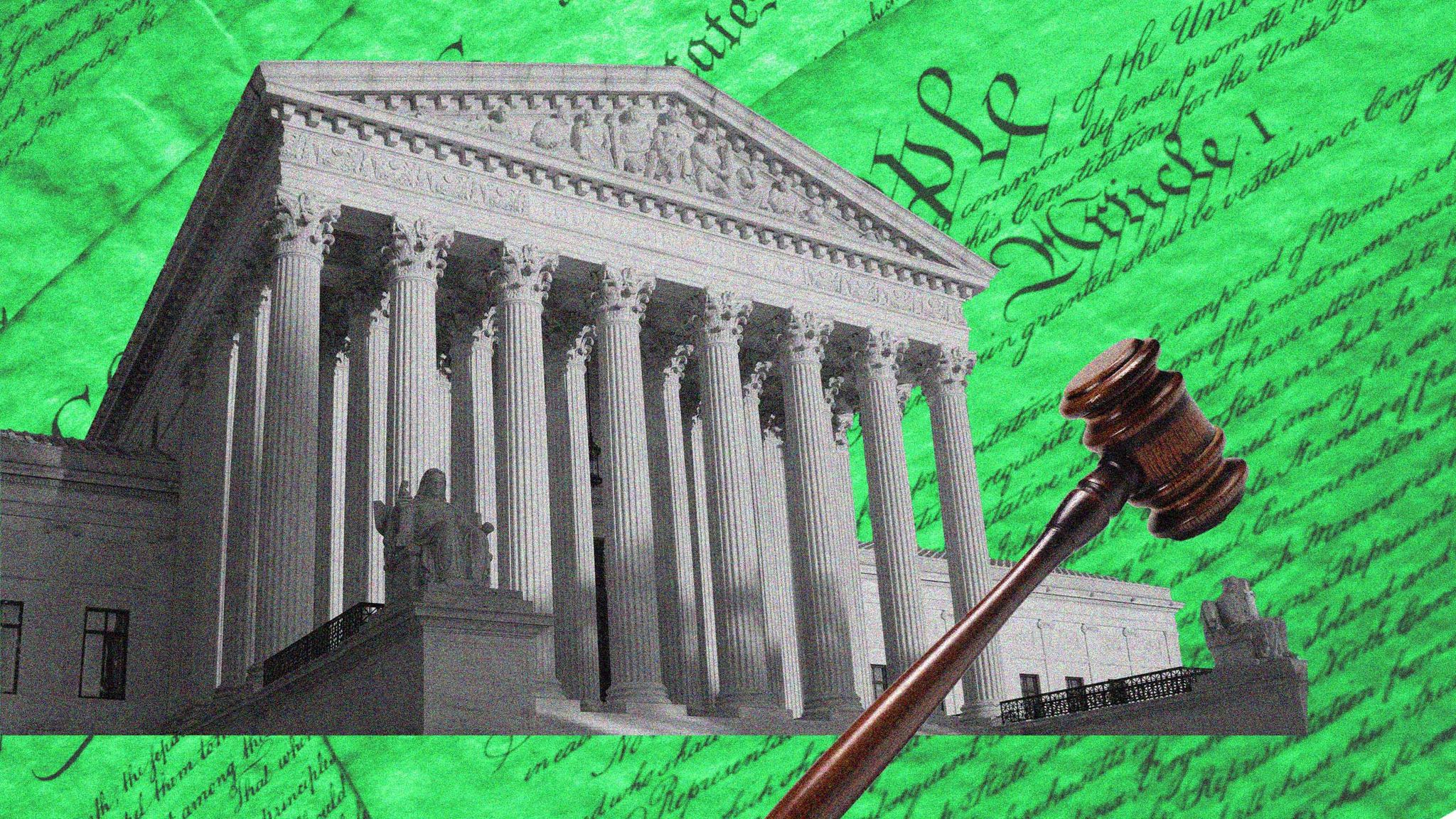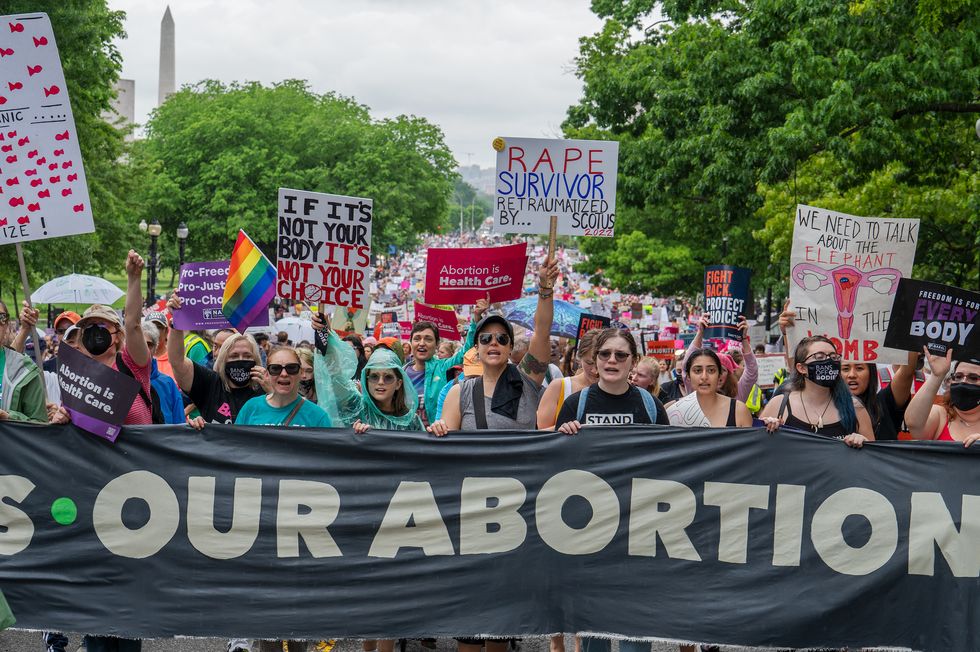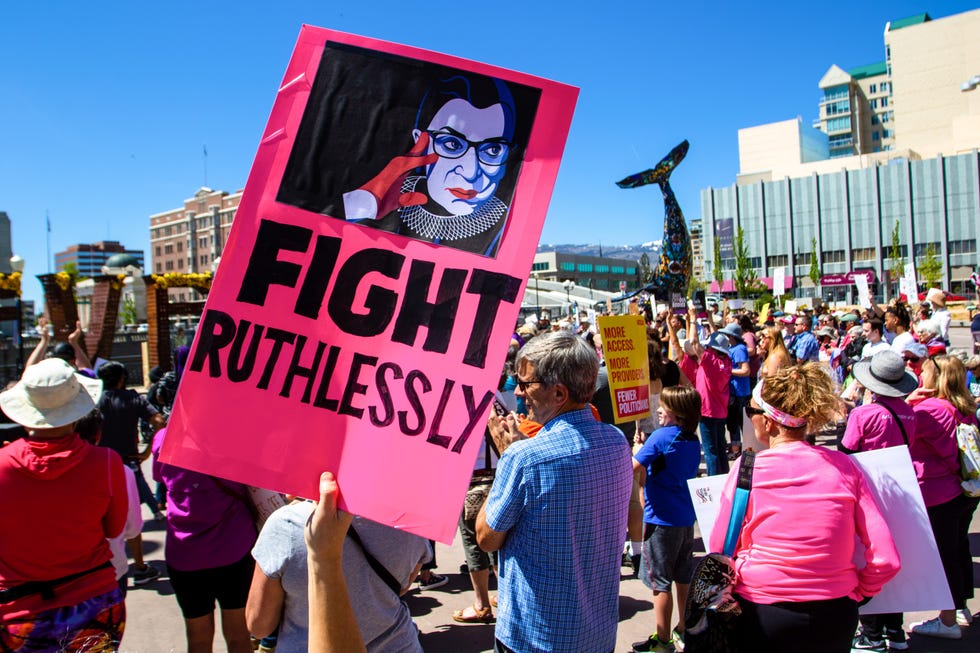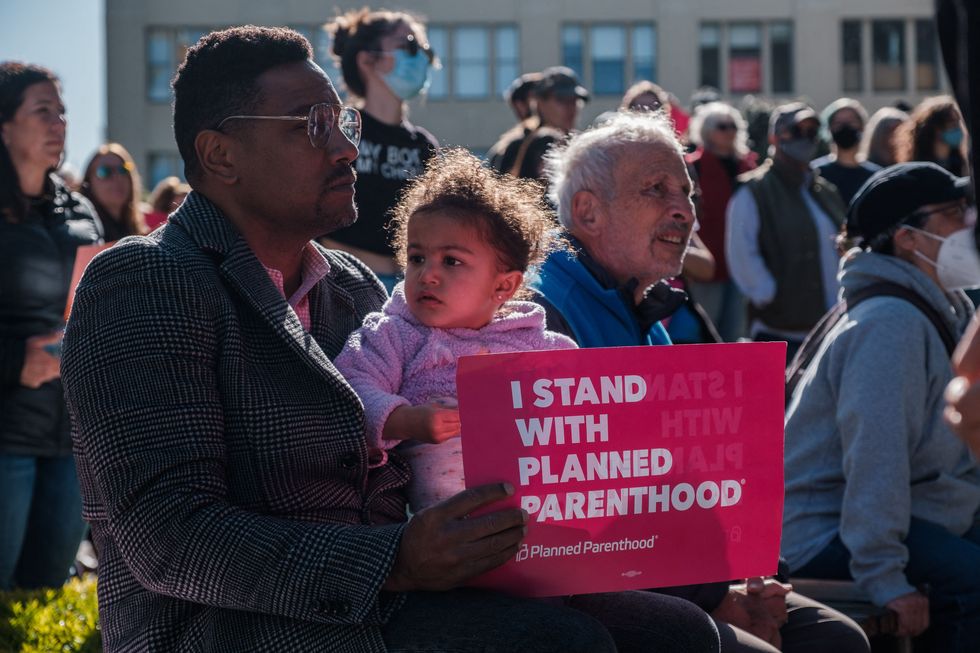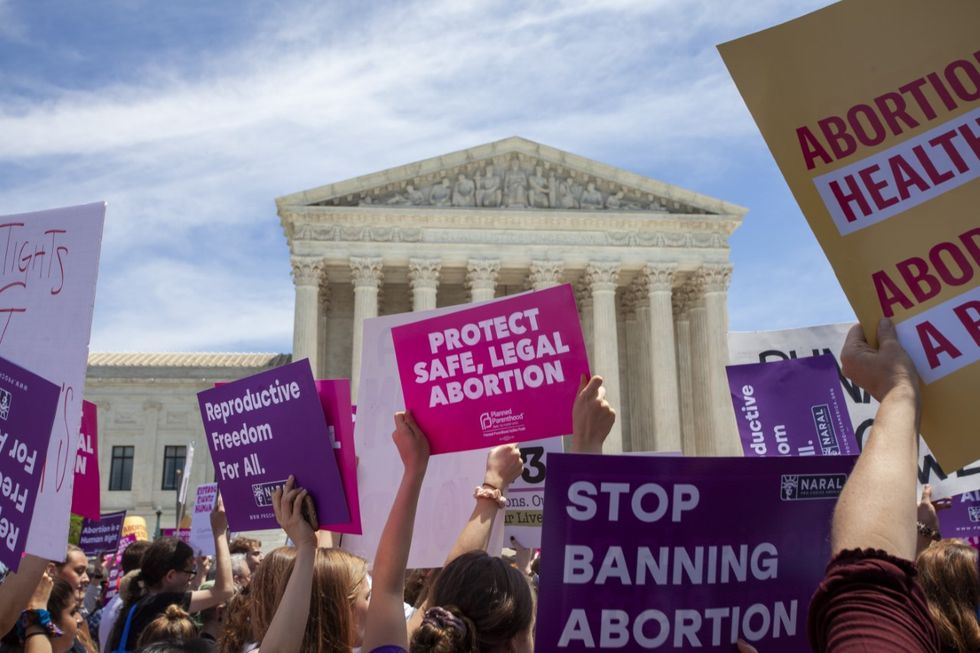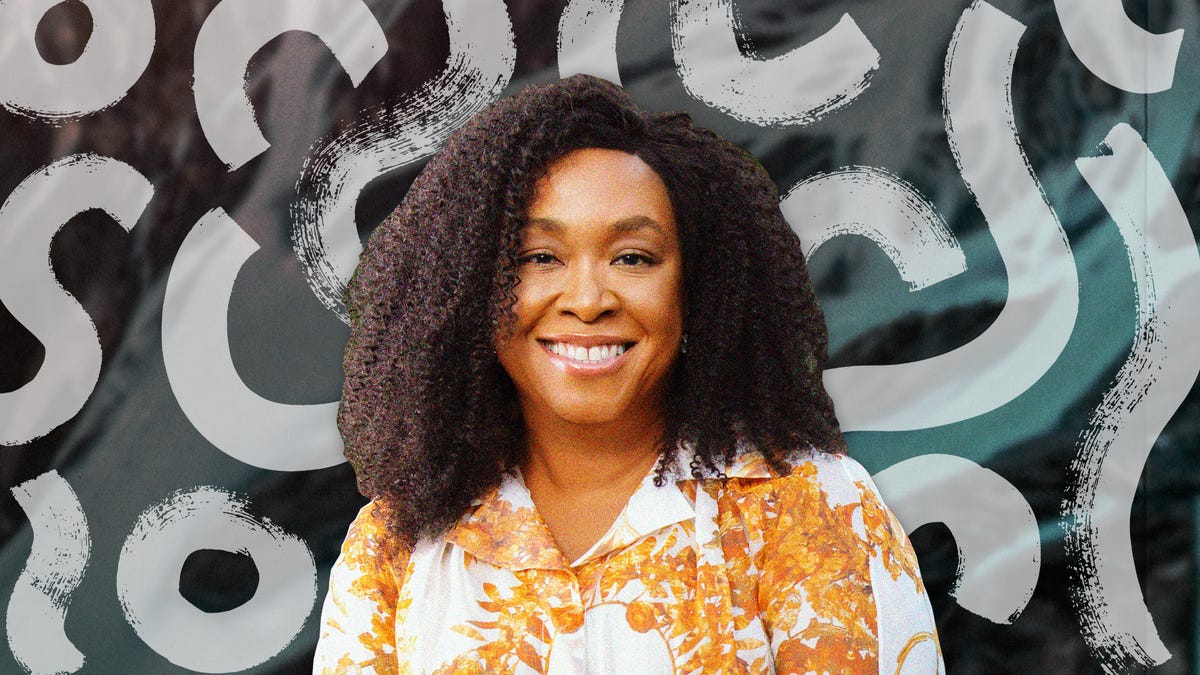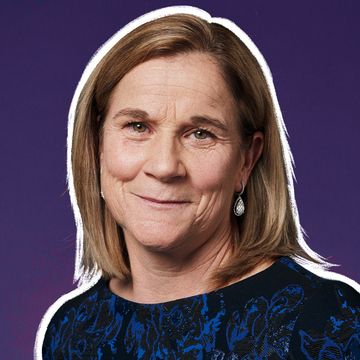On June 24, the conservative-leaning Supreme Court of The United States decided in a 6-3 vote to overturn the 1973 case Roe v. Wade, which has made abortion legal in the U.S. for the last 50 years. Back in May, a draft decision marked as the “Opinion of the Court” leaked via Politico indicating such a ruling could be coming, and, woefully, it came to pass, thereby enacting 13 trigger laws across the nation that totally ban or severely limit abortion access.
While the impact this will have on women's health is devastating, when the leaked opinion began being thoroughly analyzed, some experts believed that the specific cases that the author of the draft, Justice Samuel Alito, cited indicated that the conservative-leaning Supreme Court could be aiming its legal firepower at everything from contraception access to LGBTQ+ rights. Now that possibility seems far more certain, especially given Justice Clarence Thomas's solo concurring opinion that he made with the full overturning of Roe v. Wade.
David S. Cohen is a professor of law at Drexel University’s Thomas R. Kline School of Law who explores the intersection of constitutional law and gender, with a focus on how the law impacts abortion, as well as sex segregation and masculinity. He also researches voting anomalies in the Supreme Court. He and two other law professors wrote a piece for Rolling Stone that argues that if the draft decision becomes final, the Supreme Court is condemning women to second-class status.
One of the key tenets of the original Roe v. Wade decision hinged on the right to privacy, which is protected by the 14th Amendment of the Constitution. Cohen says that, even before Thomas issues his solo opinion, Alito's draft decision directly attacked that right and the protections that it offers.
“The draft opinion basically undercut an entire law under privacy decision-making about personal, familial, intimate lives,” Cohen told Shondaland in a phone interview. “Alito tried to say [the draft] was only about abortion, but there’s nothing about his reasons that make it actually only about abortion. This underpins the right to marry, sexual privacy, and the right to medical care decision-making and contraception. All those things could be at risk if this leaked decision is close to the final decision.”
Contraception (Birth Control) Access
According to the experts Shondaland spoke with for this story, the next most likely target that could be impacted could be contraception and access to contraception.
Under the 1973 Roe v. Wade decision, a woman’s right to privacy is guaranteed in the 14th Amendment to the Constitution. With these rights, guaranteed 50 years ago by the Roe v. Wade decision that supported a woman’s right to bodily autonomy and abortion, now struck down, the doors are open for conservatives to ban certain types of contraception and access to Plan B and other pills. The right to privacy is also part of the rationale for the Griswold v. Connecticut decision in 1965, which recognized a right to contraception for married people. In the Eisenstadt v. Baird case in 1972, the Supreme Court expanded the right to contraception to include everyone else who was not married.
For years, anti-abortion activists have suggested that contraceptives like Plan B, IUDs, and other forms of hormonal birth control are abortifacients, or “an agent … that induces abortion.” Claims that these agents cause abortion are scientifically incorrect, according to the Guttmacher Institute, a well-respected research and policy agency that focuses on sexual and reproductive health and rights, and according to the basic science behind the methods, per the National Library of Medicine at the National Institutes of Health. These contraceptive methods do not end an existing pregnancy; they prevent one from happening in the first place.
Though the Alito draft decision stated that the ruling in Dobbs v. Jackson should not be applied to other rights, stating: “We emphasize that our decision concerns the constitutional right to abortion and no other right,” and adding, “Nothing in this opinion should be understood to cast doubt on precedents that do not concern abortion,” Thomas's solo opinion adds to the growing concern that certain birth-control measures and other rights will be under attack next.
In Idaho, for example, state Representative Brent Crane, a Republican, said in a TV interview that he would “probably” agree to hear legislation that proposes to ban the emergency contraception pill Plan B. On the topic of IUDs, he also said, “IUDs, I’m not sure yet where I would be on that particular issue.”
Even more extreme measures are being examined in Louisiana, where legislators are at work on a bill that would allow murder charges for abortions and declare “personhood” to begin at fertilization, a concerning trend that’s been making its way through conservative courts and legislatures across the country. Republican Governor of Mississippi Tate Reeves didn’t rule out similar legislation in an interview on CNN.
At the federal level, Senator Marsha Blackburn, a Republican from Tennessee, recently denounced the 1965 Griswold v. Connecticut case, calling the ruling “unsound.” Griswold v. Connecticut protected the right of married people to access contraception and birth control. This decision was also based on the right to privacy.
“Contraception, even before the public saw the leaked draft, was already under attack from both state and federal laws and court decisions, both that stigmatized birth control and restricted access to birth control,” Michelle Banker, the director of reproductive rights and health litigation at the National Women’s Law Center, told Shondaland. “So, I think that the draft decision only fuels the fire for these attacks that have come both at the legislative level and court level. I think that there is a risk to birth control from this decision from the broader narrative written into it.”
LGBTQ+ Sexual and Marital Relations
The potential targets of the wide and sweeping decision to overturn Roe v. Wade may not end with abortion and contraception.
Katherine Sender is a professor in the Department of Communication and the Feminist, Gender, and Sexuality Studies Program at Cornell University. She says that the abortion decision issued by the Supreme Court questions the right to privacy that also underlies the overturning of anti-sodomy laws, and thus marriage equality.
Many of the hard-won protections that the LGBTQ+ community has today have only recently been secured. In 2003, the Supreme Court ruled in Lawrence v. Texas that same-sex sexual activity was legal in every state and United States territory. Gay marriage was only recognized at the federal level in the landmark case of Obergefell v. Hodges in 2015.
“The right to privacy is taken from the 14th Amendment, the right to due process,” Sender says. “The leaked Alito draft and the Court's ultimate decision are basically saying the right to due process doesn’t extend to privacy — there are other rights that trump due process. If you take the right to due process out of one area, in a private matter, what is to stop that to be argued around same-sex relationships and marriage equality?”
Under the Due Process Clause of the 14th Amendment, the Constitution states that no state shall “deprive any person of life, liberty, or property without due process of law.” The liberties protected by this clause include the rights enumerated in the Bill of Rights. The argument for legalizing gay marriage was that denying marriage to anyone deprives Americans of the freedom to marry without due process of law. Thus, denying gay couples the right to marriage didn’t offer gay couples equal treatment under the law.
Sender continues by saying that the Court's ruling also undermines the right to privacy, even though Alito's original draft opinion states that the decision enumerated in it should not be applied to anything outside of abortion, as mentioned above.
“Alito said at various places, we are only just taking this right away in terms of abortion. If you argue that for abortion, you could argue that for same-sex sexual activity. The fact that he put that in the draft is an implicit recognition that the same argument could be used against same-sex activity and marriage. I think the fact that he’s trying to head that off at the pass is a symptom of a bigger issue.”
That bigger issue, many advocates and scholars argue, is that now that Alito’s draft is final, it tacitly admits that the same arguments used to strip the right to abortion could be used to strip the LGBTQ+ community of its rights to everything from marriage to sexual relations.
How to Protect These Rights
Undoing constitutionally protected core tenets and rights that people around the country have built their entire lives on — rights that have been around for the last 50 years — poses a grave risk to civil rights and democracy, according to experts.
“The Republicans have been very shrewd at playing a very long game both at courts and the local level,” Sender says. “They have turned the judicial system very conservative. When you look at the stats, around 70 percent of the population believe that people should have the right to an abortion and about 70 percent of people support marriage equality. Then you look at the elected officials and the number plummets.
“There are way fewer people in the House and Senate, and even fewer in local municipalities, who support what the majority of the American public support,” she continues. “So, that really alarms me. It shows that both the Supreme Court and elected representatives are not actually representing the will of the American people, and they are taking this moral crusade.”
That moral crusade has undone nearly half a century of rights for more than half the population of the United States, many experts argue. The only ways to prevent such wide and sweeping upheavals are to vote, protest, advocate, donate to causes you believe in, and let your voice be heard by your local, state, and federal politicians.
“Now is the time for pro-choice politicians to do more than express their concern and act,” Cohen says. “In states where abortion remains legal, politicians need to take actions to protect patients from other states, and support abortion providers,” he continues. “On the national stage, every member of Congress needs to step up and protect women’s and human rights.”
Abigail Bassett is an Emmy-winning journalist, writer and producer who covers wellness, tech, business, cars, travel, art and food. Abigail spent more than 10 years as a senior producer at CNN. She’s currently a freelance writer and yoga teacher in Los Angeles.
Get Shondaland directly in your inbox: SUBSCRIBE TODAY
